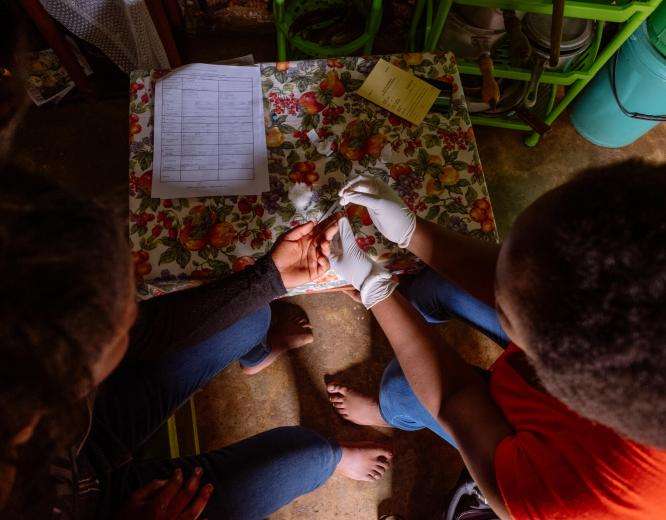Progress in fight against HIV, TB, and malaria is backsliding in some of the places MSF operates
The global fight against the three main killer diseases—HIV/AIDS, tuberculosis (TB), and malaria—has ground to a halt. In recent years, teams with the international medical humanitarian organization Doctors Without Borders/Médecins Sans Frontières (MSF) around the world have seen worrying signs of a reversal in progress against all three diseases.
To prevent further backsliding, donor countries must increase their pledges at The Global Fund to Fight AIDS, Tuberculosis, and Malaria’s replenishment conference in New York this week.
The $18 billion asked for by the Global Fund—a crucial funding mechanism in the global fight against these three major infectious diseases—is the bare minimum of what is needed. Even if the Global Fund gets the $18 billion it's asking for, it won't be enough to prevent people across the world from needlessly dying from these infectious diseases.
An estimated $130 billion is needed for HIV, TB, and malaria for the period 2024-26. With the Global Fund supplying 14 percent of that budget—assuming that $18 billion is raised—and other external funding supplying another 19 percent, domestic funding should account for 45 percent. This leaves a huge gap of 22 percent. But at present, it looks very unlikely that enough domestic funding will be mobilized to cover 45 percent of the $130 billion. With overly optimistic expectations for domestic funding, we can expect an actual gap that is much bigger than the predicted 22 percent.
This situation should come as no surprise. In 2019, MSF published a report warning that the HIV and TB responses had come to a standstill, largely because the world was too optimistic about how much of the financing for programs to combat the diseases could be shouldered by low- and middle-income countries.

Briefing Paper: Bridging the Gaps
The neglected pandemics: HIV/AIDS, tuberculosis, and malaria
A new briefing paper by MSF teams in 2022 shows how the COVID-19 pandemic and concurrent economic and social crises have exacerbated existing problems for HIV, TB, and malaria. The consequences are dire in places like Central African Republic, Democratic Republic of Congo, Guinea, Mozambique, Myanmar, South Sudan, and Uganda. Countries like these have been forced to cut effective interventions from their plans, the quality of care has suffered, and there is less support for community health programs.
Ultimately, it is the people with HIV, TB, and malaria who bear the brunt of these funding gaps.
Mortality and morbidity figures for TB clearly show the reversal of gains made in previous years. As many people are dying from TB now as they did in 2017, with 1.3 million deaths per year. Meanwhile, an estimated 10 million people are becoming infected with the disease each year. It is a similar situation with HIV; the numbers of people testing for the infection have fallen by 22 percent while prevention services have dropped by 11 percent. Some 9.5 million people living with HIV are still not on treatment. Almost one-third of those who seek to start treatment already show signs of advanced HIV disease, putting them at high risk of imminent death. The number of people falling ill with malaria has increased to 2015 levels, and the number of people dying from malaria is up 12 percent from 2019.
To close these existing gaps and prevent further harm, donor countries must step up their pledges during the Global Fund replenishment conference by at least 30 percent compared to their previous pledges. While some countries like the US and Japan have made firm and substantial commitments, many European donors have yet to do so.




